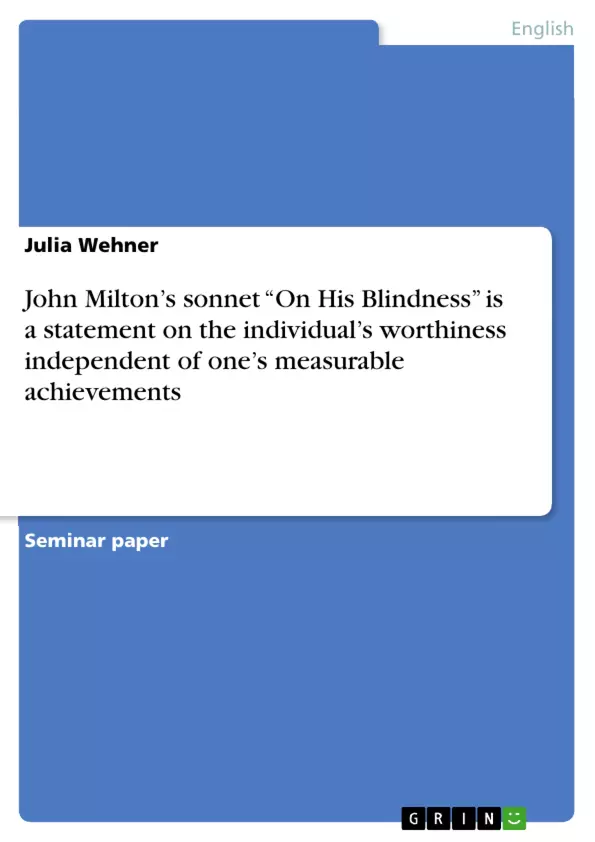John Milton criticizes our modern achievement-oriented society in his sonnet “On his blindness” because nowadays performance is a precondition for high regard and appreciation of somebody. However, his poem can serve as a statement in favor of a person’s worthiness independent of one’s performance and workload.
The expression achievement-oriented society means that the distributions of goods like economic resources but also “prestige” and “power” are dependent on the attributed individual’s performance. This functionality is the so called “achievement principle” (Arzberger 24). In other words: Reputation is due to measurable accomplishments. Who does not achieve enough, does not gain any esteem.
In order to examine my thesis I am going to analyze both the sonnet’s poetic and rhetorical form. First of all I am going to point out the gist of the poem briefly.
Table of Contents
- Introduction
- Milton's sonnet "On His Blindness"
- Content and the author's background
- Poetic and rhetorical form
- Conclusion
- Works cited
Objectives and Key Themes
The objective of this analysis is to examine John Milton's sonnet "On His Blindness" through a modern lens, focusing on its critique of achievement-oriented societies and its assertion of inherent human worth regardless of measurable accomplishments. The analysis will explore the sonnet's poetic and rhetorical devices to understand how Milton conveys this message.
- Critique of achievement-oriented societies
- The concept of inherent worth independent of performance
- Milton's religious beliefs and their influence on the poem
- The sonnet's poetic and rhetorical structure
- A comparative analysis of 17th-century and modern societal values
Chapter Summaries
Introduction: This introductory section lays the groundwork for the analysis by establishing the central thesis: that Milton's sonnet challenges the modern emphasis on achievement as the sole determinant of worth. It introduces the concept of an "achievement-oriented society" where reputation hinges on measurable accomplishments, contrasting it with the poem's assertion of inherent human value irrespective of performance.
Milton's sonnet "On His Blindness": This chapter delves into Milton's sonnet, beginning with an examination of its content and the author's personal background. It highlights the connection between Milton's own blindness and the poem's themes of worthiness and service to God. The chapter explores Milton's deeply religious perspective, evident in his allusions to biblical parables, particularly the parable of the talents. The chapter also notes the dramatic element introduced by the dialogue between the speaker's lament and the voice of patience.
Keywords
John Milton, "On His Blindness," sonnet, achievement-oriented society, inherent worth, religious belief, poetic form, rhetorical analysis, biblical allusions, parable of the talents, 17th-century society, modern society.
Frequently Asked Questions: Analysis of John Milton's "On His Blindness"
What is the main objective of this analysis of Milton's sonnet "On His Blindness"?
The analysis aims to examine Milton's sonnet through a modern lens, focusing on its critique of achievement-oriented societies and its assertion of inherent human worth regardless of measurable accomplishments. It explores how Milton uses poetic and rhetorical devices to convey this message.
What are the key themes explored in this analysis?
Key themes include a critique of achievement-oriented societies, the concept of inherent worth independent of performance, Milton's religious beliefs and their influence on the poem, the sonnet's poetic and rhetorical structure, and a comparative analysis of 17th-century and modern societal values.
What is covered in the introduction of the analysis?
The introduction establishes the central thesis: that Milton's sonnet challenges the modern emphasis on achievement as the sole determinant of worth. It introduces the concept of an "achievement-oriented society" and contrasts it with the poem's assertion of inherent human value irrespective of performance.
What does the chapter on Milton's sonnet "On His Blindness" cover?
This chapter analyzes the sonnet's content and connects it to Milton's personal background (his blindness). It highlights Milton's religious perspective, evident in biblical allusions (particularly the parable of the talents), and notes the dramatic element of the dialogue between lament and patience within the poem.
What is included in the table of contents?
The table of contents includes an introduction, a detailed section on Milton's sonnet (covering content and poetic/rhetorical form), a conclusion, and a list of works cited.
What keywords are associated with this analysis?
Keywords include John Milton, "On His Blindness," sonnet, achievement-oriented society, inherent worth, religious belief, poetic form, rhetorical analysis, biblical allusions, parable of the talents, 17th-century society, and modern society.
What is the overall structure of the provided document?
The document provides a comprehensive preview of a language analysis, including a table of contents, objectives and key themes, chapter summaries, and keywords. It is structured to give a clear overview of the analysis's content and approach.
- Quote paper
- Julia Wehner (Author), 2011, John Milton’s sonnet “On His Blindness” is a statement on the individual’s worthiness independent of one’s measurable achievements, Munich, GRIN Verlag, https://www.grin.com/document/173222



